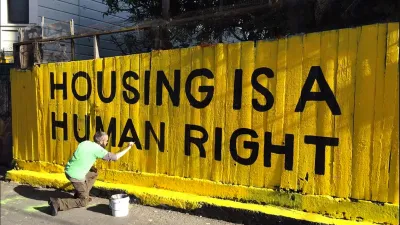A set of proposals aimed at improving housing affordability will go before the Denver City Council after approval by a committee.

Three affordable housing proposals will be presented at a public meeting before the Denver City Council, reports Joe Rubino. “The policy mandates all new housing projects of 10 or more units include at least 8% affordable housing units or face steep fees. It also greatly increases fees on most other kinds of development in the city to fund other affordable housing efforts.”
The committee approved two amendments, one of which lets developers avoid building on-site parking by committing to a larger number of affordable units in their projects. “Under the version of the policy advanced by the planning board earlier this month, only projects within 1/4 mile of a rail stop in the city would be eligible for the exemption from providing parking. [Councilwoman Amanda Sandoval]’s amendment would expand that to any project within 1/4 of a mile of any high- or medium-capacity transit corridor in the city where the city has invested in better transportation infrastructure.” This amendment, Rubino notes, is likely to face opposition in the full City Council.
“The [second] amendment, which was unanimously approved, dictates that all development projects in the city’s pipeline at the time the affordable housing policy takes effect will still pay linkage fees that rise with inflation.” However, “The policy would do away with the inflation-based model in favor of a much steeper graduated increase to the linkage fees schedule” for future projects.
Nine other amendments intended to set higher standards for affordability in neighborhoods “vulnerable to gentrification and displacement” were voted down by the committee.
FULL STORY: Denver’s controversial affordable housing proposal avoided a major overhaul. Here’s how it did change.

Alabama: Trump Terminates Settlements for Black Communities Harmed By Raw Sewage
Trump deemed the landmark civil rights agreement “illegal DEI and environmental justice policy.”

Planetizen Federal Action Tracker
A weekly monitor of how Trump’s orders and actions are impacting planners and planning in America.

The 120 Year Old Tiny Home Villages That Sheltered San Francisco’s Earthquake Refugees
More than a century ago, San Francisco mobilized to house thousands of residents displaced by the 1906 earthquake. Could their strategy offer a model for the present?

In Both Crashes and Crime, Public Transportation is Far Safer than Driving
Contrary to popular assumptions, public transportation has far lower crash and crime rates than automobile travel. For safer communities, improve and encourage transit travel.

Report: Zoning Reforms Should Complement Nashville’s Ambitious Transit Plan
Without reform, restrictive zoning codes will limit the impact of the city’s planned transit expansion and could exclude some of the residents who depend on transit the most.

Judge Orders Release of Frozen IRA, IIJA Funding
The decision is a victory for environmental groups who charged that freezing funds for critical infrastructure and disaster response programs caused “real and irreparable harm” to communities.
Urban Design for Planners 1: Software Tools
This six-course series explores essential urban design concepts using open source software and equips planners with the tools they need to participate fully in the urban design process.
Planning for Universal Design
Learn the tools for implementing Universal Design in planning regulations.
Clanton & Associates, Inc.
Jessamine County Fiscal Court
Institute for Housing and Urban Development Studies (IHS)
City of Grandview
Harvard GSD Executive Education
Toledo-Lucas County Plan Commissions
Salt Lake City
NYU Wagner Graduate School of Public Service





























